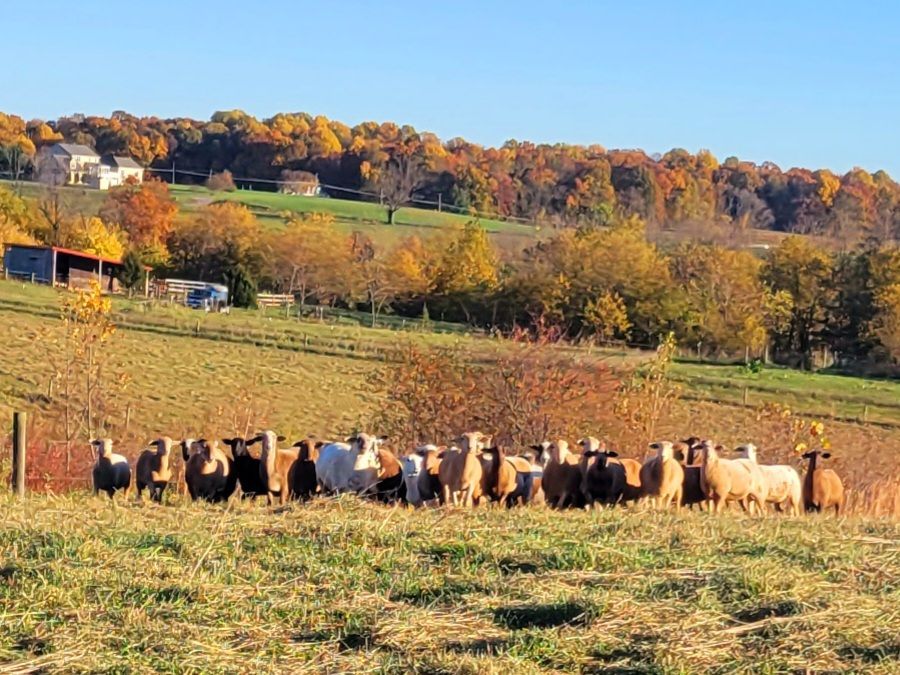FAQ
1) How much room does a 25 lb box of meat take up in a freezer?
Not as much as you might imagine. Meat is dense, so 25 lbs will just about fill up a regular sized re-usable shopping bag (I measured one at 12" x 13" x 8") See the green bag in the photo at right.
2) What do you mean 100% grass-fed? Don't they need salt? and what about winter?
We do feed hay in the winter, but since that is dried grass, it counts. We also supply salt and other minerals, just like wild animals seek out from the ground. This adds to the health of everyone and does not harm the nutritional profile of the meat the way grain supplementation would.
3) Why is grass-fed or pastured so important, and what is the difference?
You have to be careful. Some producers say grass-fed and also feed grain, so that is why we use the term 100% grass-fed. You can always ask. If farmers are uncomfortable with questions about their practices, it may mean they have something to hide. 100% grass-fed is important because even the smallest amount of grain will destroy the wonderful omega 3s in grass-only meat and milk and virtually eliminate the medicinal nutrient CLA. However, it is much easier to raise delicious lamb by feeding grain. Otherwise, one has to use very particular breeds, a more labor intensive pasture management, and keep fewer animals. We use the term "pastured" for animals that are out on pasture but also get grain-based feed (such as well-raised poultry and pork).
4) I have heard that butchers sometimes give customers the meat from the wrong animal. How do you prevent this?
I have carefully screened the harvesters I use and am confident that they are thorough and careful about keeping track of the ownership of product in their possession.
5) Is your food organic?
We are not certified organic because there is a tremendous amount of paperwork involved that would put us out of business. Therefore, we cannot use the term "organic." However, we are very careful about what we bring onto our farm. We do not give our animals medications or chemicals of any kind (except minimal needed vaccines) on a routine basis. We generally treat medical issues with herbs and such. Only if absolutely necessary do we resort to conventional veterinary treatment, which is rare.
6) I have heard meat animals are bad for the environment. What about the methane?
Our sheep do fart ;0) Even wild animals fart. We can't have a world without animals. large grazing herd animals, well-managed, are essential for preventing or reversing desertification in some areas, for maintaining grasslands and for sequestering carbon in grasslands. They are an utterly essential part of the cycles of nature. I think the cow fart drama is a distraction from the harm being done by feedlots, corporate greed, and all the powerful industries ravaging our precious world. For example, it has recently come to light that scientists calculating the relative contribution to climate change of different sources of greenhouse gases used self-reported numbers from the chemical fertilizer industry. Which turned out to be many orders of magnitude too low. Surprise, surprise. Which means that all those fields of beans and grains folks are eating when they aren't eating beef are adding a lot more to the climate problem than we thought, and factory farmed meat (ie - cows plus pesticide- and fertilizer-drenched soy and corn), even more so! Not to mention that those giant soybean fields are not feeding wildlife, not protecting the bays and rivers from erosion and ag pollution, are losing our precious soil, and not nourishing people as well as well run animal based eco farms.

-7) What is Regenerative Agriculture?
Regenerative Agriculture is a system of farming principles and practices that increases biodiversity, enriches soils, improves watersheds, and enhances ecosystem services. Regenerative Agriculture aims to capture carbon in soil and above-ground biomass, reversing current global trends of atmospheric accumulation. In other words, we can take the carbon out of the air where it is hurting us and add it to the soil where it is helping us (as organic matter). We can do this through a certain kind of management of grazing animals that mimics the way wild herds of bison and such used to move. When the plants get to grow back before they are grazed again (as opposed to constantly grazed short by free wandering grazers) they take the carbon from the air to grow and shed it into the ground where it becomes organic matter. Some researchers say grazing the land this way even sequesters more carbon than planting the pastures in trees! This method of management mostly involves using portable electric fence to give the animals a small new piece of pasture every day and letting the rest of the pastures rest for a couple of months between grazings. It also protects the watershed through much higher plant density covering the soil, protects wildlife (and bees!) through a greater diversity, maturity and desirability of the plant species present, and is much better for the livestock as well. These pastures are much better for the ecosystem than fields of grain, even if organic. So save the world by eating your 100% grassfed meat.

